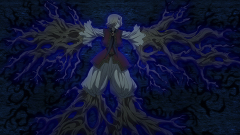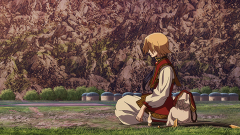Shoukoku no Altair seems to be settling into a rhythm. For an episode containing as much new terminology and backstory as this one, “The Eagle’s Joint Struggle” moved from beat to beat with an ease I wasn’t anticipating. That tone is partly owed to the character of Baskan Suleyman, whose competent yet approachable personality dominated the proceedings this week. As one of just two survivors of the Tughril people, you might expect him to be a darker, less forgiving figure, but his competence and charm made him my favorite cast member thus far. Mahmut seemed to have a similar opinion, which transforms his journey into one of purpose, rather than exile. It was great fun to see the two falconers swap stories and team up on a few of Louis’ flunkies. Mahmut now has his first real comrade, as opposed to the mentors, friends, and enemies he’s encountered until this point, and that’s a welcome addition to the series.
It wasn’t all fun and games this week, however, as the episode-opening dream sequence made the horrors of our hero’s past more vivid than ever before. During the first of these visions, Mahmut was literally rooted to the ground while his mother was murdered before his eyes. One new detail I spotted in this scene was the baby she cradled as her attackers advanced – this couldn’t have been her first child, since Mahmut was five years old when his village was burned, so perhaps his younger sibling was tragically taken from him that night, as well. Even more interesting would be if a third Tughril tribesman still lived, perhaps as a member of the Empire, having been captured during the raid. We aren’t given too much time to reflect on these possibilities, however, as the dream shifts to feature shadowy figures that prey on Mahmut’s self-doubt and tear at his eyes and ears. This is a new, more serious tone for the show, so it’s good that some friendly faces were introduced later to provide some balance.
Those faces belong to Barbaros, a kulak (Turkish for “ear”) in Zaganos’ spy network, and the aforementioned Suleyman, both of whom reveal themselves to Mahmut when he pays a visit to his home village. The show wasted no time in demonstrating the function of the Pyramis from last time; when held under a fountain at particular shrines, it emits a beam of light that Zaganos’ people can identify, and which Barbaros quickly spotted this week. It’s such a clever device that I’m already past worrying about how easily it fell into Mahmut’s lap, and ready for him to travel to more shrines and meet more potential allies. Not that I’ll forget Suleyman any time soon – his goal of using the spy network to prevent war stands in fascinating contrast to Zaganos’ apparent desire for it, so there may be an ideological clash in their future. Perhaps the larger arc of the series will be Mahmut flipping the spy network’s ultimate purpose from one of conflict to one of peace. Then again, maybe the Poison General isn’t as war-hungry as he appears, and everything we’ve seen from him so far has been part of a much longer game.
I’d be remiss if I didn’t mention some of the smaller details this week that really helped the episode breathe, including the brief ritual Mahmut performed upon his arrival at Yeni Tughril. What really impressed me about this scene was its lack of explanatory voiceover – we know from context that the water is intended to pay respect to the dead, and while the finer details may escape us, the silence makes the moment that much more poignant. (That being said, anyone who wants to offer additional commentary on that scene is more than welcome to do so!) Also worth noting is Mahmut’s observation that the area’s wild eagles will migrate north soon, so he won’t be able to use them in combat for a while. These quiet moments gave the show a healthier, more natural air this week, so I’ll be on the lookout for them next time, as well.





Translation of the Suleyman’s titles in case any one is interested:
Kara Kanat: black wing
Goz kulak bashkan: Chief of eyes and ears